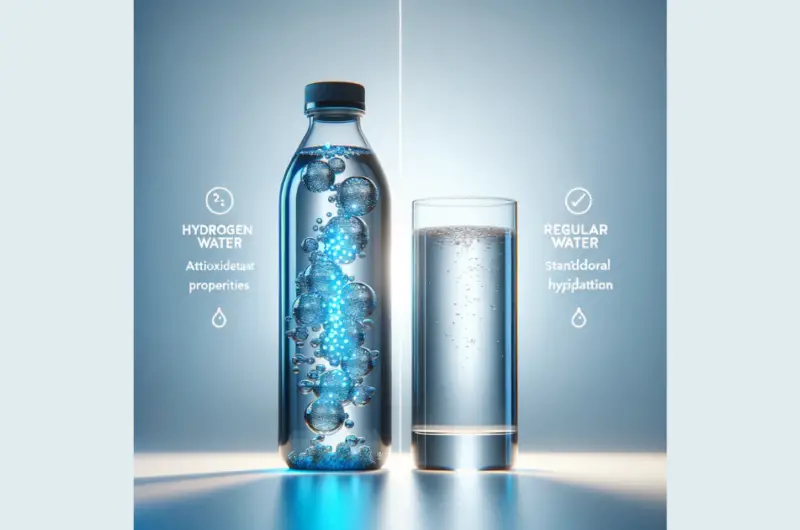Water is the essence of life, essential for hydration, bodily functions, and overall well-being. In recent years, hydrogen water has gained attention for its potential health benefits, leaving many to wonder if it’s superior to regular water. But is hydrogen water truly better, or is it just another health trend? In this article, we’ll explore the differences between hydrogen water and regular water, their potential health benefits, scientific backing, and whether one is truly superior to the other.
What is Regular Water?
Regular water, also known as tap water, purified water, or bottled water, is simply H₂O—two hydrogen atoms bonded to one oxygen atom. It hydrates the body, helps regulate temperature, aids digestion, and supports numerous bodily functions.
Regular drinking water comes in several forms:
- Tap Water: Water supplied to households and businesses, treated to meet safety standards.
- Bottled Water: Packaged water that can be spring water, purified, or distilled.
- Mineral Water: Naturally rich in minerals like calcium, magnesium, and potassium.
- Distilled Water: Purified through distillation, removing most impurities and minerals.
While regular water is vital for survival, hydrogen water claims to take hydration to the next level.
What is Hydrogen Water?
Hydrogen water is simply regular water that has been infused with additional molecular hydrogen (H₂). Proponents claim this added hydrogen provides extra health benefits beyond regular hydration.
Hydrogen is a small, non-toxic gas that can dissolve in water. In hydrogen water, extra H₂ molecules are introduced via electrolysis or bubbling hydrogen gas into the water. Unlike oxygen, hydrogen does not alter the taste, texture, or appearance of water.
Hydrogen-rich water has gained popularity due to studies suggesting its potential as an antioxidant, anti-inflammatory agent, and supporter of cellular health. But how does it compare to regular water?
How Hydrogen Water Differs from Regular Water
| Feature | Regular Water | Hydrogen Water |
|---|---|---|
| Composition | H₂O | H₂O + Extra H₂ |
| Antioxidant Properties | None or minimal | Contains molecular hydrogen, a potential antioxidant |
| Taste | Neutral | Neutral |
| Cost | Low (tap water is free) | Expensive (requires hydrogen infusion) |
| Scientific Backing | Well-established benefits | Still being researched, but promising |
Hydrogen water’s key difference lies in its antioxidant potential, but how does this impact health?
Potential Health Benefits of Hydrogen Water
Advocates of hydrogen water suggest it provides a range of health benefits, including:
1. Antioxidant and Anti-Inflammatory Properties
One of hydrogen water’s biggest selling points is its potential antioxidant power. Free radicals in the body cause oxidative stress, which can lead to inflammation and chronic diseases like heart disease, cancer, and diabetes.
Some studies suggest that hydrogen gas can act as an antioxidant, neutralizing harmful free radicals and reducing oxidative damage. A 2007 study published in Nature Medicine found that hydrogen gas could help protect against oxidative stress-related diseases.
2. Improved Athletic Performance and Recovery
Athletes often look for ways to improve performance and recovery. Some research suggests that drinking hydrogen water may reduce muscle fatigue and inflammation caused by intense exercise.
A study published in the Journal of Sports Medicine and Physical Fitness found that participants who drank hydrogen water experienced reduced lactate buildup, which may help with endurance and quicker recovery.
3. Better Metabolic Health
Preliminary research suggests that hydrogen water may help regulate metabolism, improve insulin sensitivity, and support weight management.
A study in Obesity Research & Clinical Practice showed that drinking hydrogen-rich water for eight weeks improved glucose metabolism in participants with type 2 diabetes or impaired glucose tolerance.
4. Potential Heart Health Benefits
Oxidative stress and inflammation contribute to heart disease. Some animal studies suggest that hydrogen water might help reduce blood pressure, lower cholesterol, and protect heart health.
However, more human trials are needed to confirm these effects.
5. Improved Cognitive Function
Neurodegenerative diseases like Alzheimer’s and Parkinson’s have been linked to oxidative stress. Some studies indicate that hydrogen water could have neuroprotective effects, potentially slowing the progression of these conditions.
A study in Scientific Reports found that hydrogen water improved cognitive function in elderly patients with mild cognitive impairment.
6. Anti-Aging Effects
Since oxidative stress accelerates aging, hydrogen water is often marketed as an anti-aging solution. While some research suggests it may help reduce skin damage and improve overall longevity, more studies are needed.
Health Benefits of Regular Water
Though hydrogen water has exciting potential, regular water is already packed with health benefits, including:
1. Essential for Hydration
Water is crucial for maintaining body temperature, delivering nutrients, and removing waste. Dehydration can lead to headaches, fatigue, dizziness, and more serious health issues.
2. Supports Digestion and Detoxification
Drinking enough water helps with digestion, nutrient absorption, and detoxifying the body by flushing out waste through the kidneys and liver.
3. Boosts Energy Levels
Dehydration can lead to low energy and brain fog. Staying hydrated keeps the body functioning optimally.
4. Regulates Body Temperature
Sweating and perspiration help regulate body temperature. Drinking enough water prevents overheating and maintains proper body function.
5. Supports Joint and Muscle Health
Water helps lubricate joints, reducing the risk of arthritis and muscle cramps.
6. Aids in Weight Management
Drinking water before meals may promote fullness, leading to reduced calorie intake and better weight management.
Regular water provides essential benefits, but does hydrogen water enhance these effects?
Scientific Backing: Hydrogen Water vs. Regular Water
While hydrogen water has promising benefits, scientific research is still in its early stages. Here’s what we know:
- Strong Evidence for Regular Water: The benefits of staying hydrated with regular water are well-documented and universally accepted.
- Emerging Evidence for Hydrogen Water: Some studies suggest hydrogen water may offer additional benefits, particularly in reducing oxidative stress and inflammation.
- Lack of Long-Term Studies: Most hydrogen water studies are small and short-term. More extensive human trials are needed to confirm its effects.
The FDA has not officially recognized hydrogen water as a medical treatment, meaning claims should be taken with caution.
Cost Comparison: Is Hydrogen Water Worth It?
Regular water is widely available and inexpensive, while hydrogen water can be costly. Hydrogen water options include:
- Pre-packaged Hydrogen Water: Bottled versions cost $3–$5 per bottle.
- Hydrogen Water Machines: Devices that infuse water with hydrogen can cost anywhere from $500 to over $2,000.
- Hydrogen Tablets: Dissolvable tablets can cost $1–$2 per serving.
For those on a budget, regular water remains the best choice.
Are There Any Risks?
Hydrogen water is generally considered safe since hydrogen is non-toxic. However:
- Overhyped Claims: Some companies exaggerate benefits without solid scientific backing.
- High Costs: It may not be worth the price for those already drinking enough water.
- Possible Contaminants in Low-Quality Products: Not all hydrogen water products are created equal; some may lack sufficient hydrogen content.
Overall, hydrogen water is safe but not necessarily superior to regular water.
Final Verdict: Which One is Better?
Hydrogen Water Might Be Worth Trying If:
- You’re looking for additional antioxidant support.
- You’re an athlete seeking improved recovery.
- You have disposable income and are curious about potential benefits.
Regular Water is the Best Choice If:
- You’re looking for an affordable and reliable hydration source.
- You want scientifically backed health benefits.
- You don’t want to spend extra money on a trend.
For most people, regular water is sufficient for staying healthy and hydrated. While hydrogen water has intriguing potential, more research is needed before it can be considered a necessity.
Hydrogen water offers promising health benefits, but it’s not a miracle cure. While some studies suggest antioxidant and anti-inflammatory properties, regular water remains the best choice for hydration. Until more extensive research confirms hydrogen water’s benefits, regular water remains the gold standard for health and well-being.
Future Research on Hydrogen Water
While hydrogen water shows promising potential, there is still a lot we don’t know. Scientists continue to explore its effects on various aspects of health, including:
1. Long-Term Effects on Chronic Diseases
Current research suggests hydrogen water may help reduce oxidative stress, a factor in chronic diseases like diabetes, heart disease, and cancer. However, most studies are short-term. Future research will need to examine its effects over many years to determine whether drinking hydrogen water consistently provides long-term health benefits.
2. Optimal Dosage and Consumption
How much hydrogen water should one drink daily for maximum benefits? Is there an optimal concentration of hydrogen in water that yields the best results? Scientists are still working to answer these questions. Future studies may provide more clarity on how much hydrogen is needed to impact health significantly.
3. Bioavailability and Effectiveness
One challenge with hydrogen water is how quickly hydrogen dissipates. The tiny molecules escape easily, meaning bottled hydrogen water might lose its benefits before consumption. Researchers are working on methods to stabilize hydrogen in water and maximize its absorption in the body.
4. Comparison with Other Antioxidants
Many foods and beverages already contain antioxidants, such as green tea, blueberries, and vitamin C. Studies will need to determine whether hydrogen water provides unique benefits or if it simply duplicates effects already achieved through a healthy diet.
5. Potential Risks and Side Effects
Although hydrogen water is considered safe, long-term studies will be crucial in identifying any potential side effects or interactions with medications.
With more research, we may soon have clearer answers on whether hydrogen water is truly a game-changer or just another health trend.
How to Make Hydrogen Water at Home
If you’re interested in trying hydrogen water, you don’t have to rely on expensive bottled versions. There are a few ways to make it at home:
1. Hydrogen Water Machines
These devices use electrolysis to infuse regular water with hydrogen gas. Some machines can cost a few hundred dollars, while more advanced ones may be priced in the thousands.
2. Hydrogen Tablets or Sticks
Dissolvable tablets or sticks can be added to a glass of water to release hydrogen gas. These are a more affordable option and cost around $1–$2 per serving.
3. Hydrogen Bottles
Some portable hydrogen water bottles allow you to create hydrogen-infused water on the go. These typically cost between $50–$200, making them a middle-ground option between machines and tablets.
Whichever method you choose, it’s important to consume the water soon after hydrogen is added, as the gas can escape quickly.
Who Should Consider Drinking Hydrogen Water?
Hydrogen water may be beneficial for certain groups of people, including:
- Athletes: Since some research suggests it can reduce muscle fatigue and inflammation, hydrogen water might help with recovery after intense workouts.
- People with High Levels of Oxidative Stress: Those exposed to high levels of stress, pollution, or poor diet may benefit from additional antioxidants.
- Individuals with Chronic Conditions: Some studies indicate potential benefits for those with diabetes, metabolic syndrome, or neurodegenerative diseases. However, more research is needed before it can be considered a medical treatment.
If you fall into one of these categories and have the financial means to try hydrogen water, it might be worth experimenting with. However, for the general population, regular water is still the best and most cost-effective option.
Myths and Misconceptions About Hydrogen Water
With its rise in popularity, hydrogen water has been surrounded by myths and exaggerated claims. Let’s separate fact from fiction.
Myth 1: Hydrogen Water Cures Diseases
While some studies suggest health benefits, hydrogen water is not a cure for any disease. It may help reduce oxidative stress and inflammation, but it is not a replacement for medical treatments.
Myth 2: All Hydrogen Water is the Same
Not all hydrogen water products contain the same amount of molecular hydrogen. Some bottled hydrogen waters may lose their hydrogen content before reaching consumers, making them less effective. Always check product quality before purchasing.
Myth 3: Drinking More Hydrogen Water Equals More Benefits
More is not always better. There is currently no scientific evidence to suggest that drinking excessive amounts of hydrogen water provides additional benefits.
Myth 4: Hydrogen Water is a New Discovery
Although it has recently gained popularity, the potential benefits of hydrogen have been studied for over a decade. Research on molecular hydrogen dates back to the early 2000s.
By understanding the truth about hydrogen water, consumers can make informed decisions rather than falling for marketing hype.
Alternatives to Hydrogen Water for Antioxidant Benefits
If you’re looking for ways to reduce oxidative stress and inflammation but don’t want to invest in hydrogen water, there are other natural and affordable alternatives:
1. Eat Antioxidant-Rich Foods
Certain foods are naturally high in antioxidants, including:
- Fruits: Blueberries, strawberries, oranges, and grapes
- Vegetables: Spinach, kale, and carrots
- Nuts & Seeds: Almonds, walnuts, and flaxseeds
- Beverages: Green tea, matcha, and red wine (in moderation)
2. Drink Herbal Teas
Green tea, chamomile, and rooibos tea contain antioxidants that can help combat oxidative stress.
3. Exercise Regularly
Moderate exercise has been shown to improve the body’s ability to fight oxidative stress naturally.
4. Reduce Stress
Chronic stress contributes to oxidative damage. Meditation, yoga, and deep breathing exercises can help reduce stress levels.
5. Stay Hydrated with Regular Water
Drinking enough water supports detoxification and keeps the body functioning efficiently.
By maintaining a healthy diet and lifestyle, you can achieve many of the same benefits that hydrogen water claims to provide—without the extra cost.
Final Thoughts: Should You Switch to Hydrogen Water?
Hydrogen water is an intriguing product with promising potential health benefits. Some studies suggest that it may reduce oxidative stress, improve athletic performance, and support metabolic health. However, the research is still in its early stages, and more long-term studies are needed to fully understand its effects.
For most people, regular water is the best and most cost-effective way to stay hydrated and healthy. If you’re curious and willing to invest in hydrogen water, there’s no harm in trying it, but it shouldn’t replace a balanced diet, exercise, and good hydration habits.
Until more scientific evidence emerges, hydrogen water remains an interesting health trend rather than a necessity. If you’re looking for real, proven ways to stay healthy, sticking with regular water and a nutrient-rich diet is your best bet.
The bottom line: Hydrogen water may offer some extra benefits, but when it comes to overall hydration and well-being, regular water is more than enough for most people.
References: that provide scientific insights into the comparison between hydrogen water and regular water:
Scientific Studies & Journals:
- Ohta, S. (2007). “Molecular Hydrogen as a Novel Antioxidant: Overview of the Advantages of Hydrogen for Medical Applications.” Nature Medicine, 13(6), 688-694.
- This foundational study explores the antioxidant properties of molecular hydrogen and its potential therapeutic applications.
- Nakao, A., Toyoda, Y., Sharma, P., Evans, M., Guthrie, N. (2010). “Effectiveness of Hydrogen Water on Antioxidant Status of Athletes.” Medical Gas Research, 1(1), 12.
- This research examines how hydrogen water affects oxidative stress and recovery in athletes.
- Kajiyama, S., Hasegawa, G., Asano, M., et al. (2008). “Supplementation of Hydrogen-Rich Water Improves Lipid and Glucose Metabolism in Patients with Type 2 Diabetes or Impaired Glucose Tolerance.” Nutrition Research, 28(3), 137-143.
- A study exploring hydrogen water’s potential benefits in improving glucose metabolism.
- Huang, C-S., Kawamura, T., Toyoda, Y., Nakao, A. (2010). “Recent Advances in Hydrogen Research as a Therapeutic Medical Gas.” Free Radical Research, 44(9), 971-982.
- Discusses how hydrogen gas, including hydrogen water, may have therapeutic effects against oxidative stress-related diseases.
- Song, G., Li, M., Sang, H., Zhang, L., Li, X., Yao, S. (2013). “Hydrogen-Rich Water Decreases Serum LDL-Cholesterol Levels and Improves HDL Function in Patients with Potential Metabolic Syndrome.” Journal of Lipid Research, 54(7), 1884-1893.
- Analyzes how hydrogen water may positively influence cholesterol and metabolic health.
- Itoh, T., Fujita, Y., Ito, M., et al. (2009). “Molecular Hydrogen Suppresses Inflammation and Prevents Apoptosis of Peripheral Nerves in Diabetic Mice.” Biochemical and Biophysical Research Communications, 388(4), 669-674.
- Examines how hydrogen water could support nerve health in diabetes patients.
- Nagata, K., Nakashima-Kamimura, N., Mikami, T., Ohsawa, I., Ohta, S. (2009). “Consumption of Molecular Hydrogen Prevents the Stress-Induced Impairments in Hippocampus-Dependent Learning Tasks During Chronic Physical Restraint in Mice.” Neuropsychopharmacology, 34(2), 501-508.
- Discusses hydrogen water’s potential in supporting cognitive function under stress.
Additional Resources:
- World Health Organization (WHO). “Guidelines for Drinking-Water Quality.” (2022).
- Provides standards for safe drinking water and hydration.
- Mayo Clinic. “Hydration and Health: How Much Water Do You Need?”
- A guide on the importance of regular water consumption for overall health.
- Harvard School of Public Health. “Water: The Best Beverage for Your Health.”
- Highlights why regular water is crucial for hydration and bodily functions.
Final Notes on References:
Most studies on hydrogen water are relatively new and require further validation through large-scale human trials. While preliminary research shows promise, the health benefits of hydrogen water should be interpreted with caution until more extensive studies confirm its long-term effects.


















